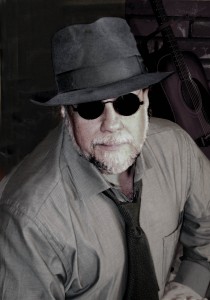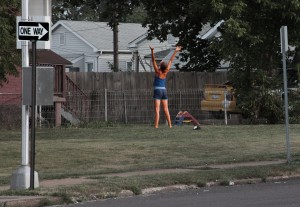Ursula K. Le Guin Interview from Jefferson County Library on Vimeo.
Category: Writing
-
Denial of Agency and Being Off Base
Recently I participated in a brief exchange on Shelfari that annoyed me. On a science fiction thread a commenter said he (or she) had recently read Isaac Asimov’s I, Robot and had enjoyed it even though the fictional conceit was off base. I asked why and the response was “His worldview is off-base because it is humanistic – it excludes God.”
That annoyed me. Actually, it pissed me off. The exchange ran a little while and then I suggested it be moved or abandoned. The admin allowed that it was a troublesome thread and it would be better to just stop it. I withdrew (except for one more exchange about why it had troubled me since as it continued it turned into a typical “does god exist” thread. My annoyance was with the assumption that stories can be judged automatically off-base because they don’t take into account a particular belief.
When pressed, the original commenter admitted that it was Asimov’s world view in general that was the problem—which means that the beliefs (or disbeliefs) of the author were used a priori to judge the quality of the stories.
Here’s the problem with that: fiction is about the human condition and the writer is responsible for getting the character and interactions within a story right. In other words, to tell the truth about people, how they feel, what they do, why they think or act certain ways. To do this, the writer must imaginatively assume the viewpoint of the characters (to greater or lesser degrees) in order to treat them honestly so what is then written about them is a true picture.
To do that, the writer must be an observer, a very accurate observer, a student of people, of humanity, even of civilization and culture.
To claim that a writer cannot write truthfully about the human condition unless he/she already holds a particular world view is sheer, slanderous nonsense. At its most basic, it suggests that to hold a particular world view might guarantee that a writer not only can but will write the truth, and that simply doesn’t follow.
But further, it suggests that the truth of human beings is hidden from a writer who doesn’t believe a particular way. Extend that, and you can take the position that a writer of any other religious view must be incapable of writing accurately and truthfully about people as compared to a writer who holds a preferred view. You are immediately immersed in the unsolvable debate over which view is the Truth (capital T) and which false. Or, furthermore, you would have to accept that a believer would be incapable of writing as honestly about atheist characters, since that is a world view not shared.
We would, very simply, be unable to speak honestly and truthfully to each other.
One would have to accept that stories written (truthfully, honestly) by a believer would somehow be different than stories written (honestly, truthfully) by an unbeliever. But that would deny the universality of human experience.
On a meaner level, this is a denial of agency. It’s very much like the argument put forth by those who think Shakespeare is a pseudonym for another author, one of which is the Earl of Oxford. The argument says that “William Shakespeare” lacked the education and aristocratic sensibility to have penned works of such insight about nobility. This completely discounts the richness of imagination writers must apply to any subject of which they lack first-hand knowledge. It says I, if I were Shakespeare, could not possibly have imagined what I wrote and told the truth so accurately because I didn’t possess the proper “world view.” You can see this argument used against any author or group of authors another group (usually not authors) seek to deny validation.
(I suggest finding a copy of the late, great Joanna Russ’s How To Suppress Womens Writing for a detailed examination of this process.)
It suggests two things that are false—one, that there are human experiences to which only select groups are privy and that no one on the outside can possibly know about, and two, that human experience is not universal on some basic level that underlays all successive experiential additions.
If a religious writer wrote truthfully about two people falling in love and an atheist wrote about the same two people, and both told the truth of what they observed and described the experience of those two characters honestly, how might they differ? For either of them to make the case, within the story, that their world view mattered in the telling of human truth, the author would have to intrude and, to greater or lesser degrees, proselytize. You would end up with a bad story at best, propaganda at worst.
Throw a dozen or two dozen stories on a desk without attribution. No one knows who the writers are. Tell me what the beliefs are of the author of each story. (This presumes excellent stories, truthful stories.) The idea that an atheist, a humanist, would write “off base” stories because of their world view is a denial of agency. What that says is that no writer not a believer could write a truthful story about believers, or that a believing writer could not possibly write a story about atheists.
Nonsense.
On the question of whether the universe would be depicted differently, well now that is a bit more interesting, but the fact is that the universe is how it is and both atheist and believing scientists see it, measure it, explain it pretty much the same way. They may argue over first causes, but in the advent of thirteen billion years since that event, both see the cosmos essentially the same way. Atoms operate the same way for both, gravity is the same for both, the life and death of stars…
But in fact, it was not the stories that prompted that initial remark, but a knowledge of the author’s world view that colored the perception. (Of course this is one more reason I tend to tell people that if they really love an artist’s work, see, hear, read as much of the work as possible before finding out anything about them. The personal facts of an artist’s life can ruin the appreciation for the work.) This is a dishonest gage. It sidesteps the only valid metric, which is, does this story say true things about people?
I won’t go so far as to say that a writer’s world view doesn’t affect the work. The whole point of doing art is to express personal opinions about subjects. But at the level of good art, all authors’ work must hold up in the court of truth, and to suggest that certain world views de facto prevent someone from telling the truth about the subject at hand is overreaching at best. You can certainly say of certain writers “his/her beliefs so color their work that it is skewed from truth” but it is not correct to say “these beliefs guarantee that their work will be skewed from truth.”
It also suggests that personal experience can be disingenuous at its core if it leads to conclusions inconsistent with a preferred world view.
Denial of agency indeed.
-
Bouchercon 2011
So I have now attended a Bouchercon.
I’ve attended so many SF conventions that they’ve become, if not normal, at least comfortable. I pretty much know what to expect. Bouchercon, while in many ways similar to an SF convention, is different enough that I felt like a newbie and a bit like an outsider. I don’t know the players, I don’t know all the rules, and I didn’t know what to expect.
There were no costumes, no gamers, no room parties (at least not open room parties), no art show, and an absence of what I like to think of secondary and tertiary effluvia in the dealers room—that is, tables of jewelry and fake weapons and action figures and the like. The dealers room was almost all books. There were a few DVDs and CDs, but 95% of it was books and magazines.
By Saturday I felt pretty comfortable. These are people gathered together for the love of a genre and some of the conversation on the panels bridged the gap to SF, confirming that the critical divisions are not between genres but with an Academic snobbery that basically says if it isn’t James Joyce or Hemingway or Pynchon, it’s garbage. I understood that and subsequently I could talk to these folks without a translator.
I got to chat (briefly but not frivolously) with Val McDermid and Laura Lippman. I did attend one publisher’s party, but I ended up leaving soon after arriving because I simply couldn’t hear in the crowd. An age thing, I think, I’m beginning to lose the ability to separate out voices in groups.
Bought too many books. Again. But then I brought more than twice as many as I bought home—there is a big publisher presence in the form of free copies. I have stacks to go through.
As to that, I feel like I’m starting over. I am profoundly under-read in mystery and thriller. I recognized many names but then there were so many more I had no clue about. But that makes it kind of exciting. I really do have ideas for this kind of fiction. It will be great to have a chance to write some of it.
As to whether or not I’ll go to another one…that depends on the status of the career. Next year’s Bouchercon is in Cleveland. The year after that, Albany, then Long Beach, and then Raleigh. If I’m doing well enough, quite likely we’ll go to couple of them. Wish me luck.
-
New Directions
I’m attending Bouchercon this week, here in St. Louis. In the last few years I’ve been drifting toward crime fiction, partly in an attempt to cultivate new fields with a view toward getting my rather stagnant career moving, partly because I’ve always written something like it.
The Robot Mysteries were, as advertised, mysteries of a sort. Crime was happening in them, investigators investigated, macabre stuff occurred. There was a bit of it in Metal of Night and a couple of major thefts (and murders) were integral to Peace & Memory. Certain Remains was a mystery, even with noir elements, and the one, poor orphaned Terminator novel I wrote, Hour of the Wolf, was very noirish in tone.
The alternate history, now making its newly-launched circuit in search of publisher, is very much a murder mystery, wrapped around a bit of steampunk. I moved on from there to write a novel set in the 18th Century that is pretty much a murder mystery and the last book I finished is a straight up and down contemporary murder mystery. Plans exist to continue all three into future novels.
So when I wondered to my agent if I should maybe attend Bouchercon (after being reminded by good pal Scott Phillips that it was, y’know, right here in town this year) I got a loud, forceful “Well, yeah!”
 So in view of a potential new career, I’m updating my image a bit, trying it on for size, as it were, and seeing how it fits. I asked Scott what to expect and he said “Well, for one thing, there are no costumes.”
So in view of a potential new career, I’m updating my image a bit, trying it on for size, as it were, and seeing how it fits. I asked Scott what to expect and he said “Well, for one thing, there are no costumes.”“Yeah,” I said, “but really all we have to do is dress well and we’re in costume.”
To which he laughed and informed me that on average the women dress to the nines and the guys show up in jeans and t-shirts.
Well. I think I’ll just go as myself.
But there are so many of them that it can be hard to choose…
Tonight the festivities kick off with a pre-Bouchercon get-together in University City at a place called Meshuggah’s where monthly readings take place, a gig called Noir at the Bar. I’ll be there.
So will my new agent. (One of them, that is—I have two, which is kind of…wow.) Yeah, despite my attempt at a cool demeanor, I’m jazzed about that. Of all the “agents” I’ve had, I have only ever met two of them, both shortly before they left their respective agencies and me.
Anyway, I probably won’t post anything till next week. I’m stepping off the platform to head in a new direction. Here’s hoping it takes me where I want to go.
-
Fiction Matters
What I do puzzles some people. Always has, even before I was doing it. All those jokes about bookworms have a solid basis in real experiences—a great many people in our lives do not understand the importance of reading. Worse, they have no clue about the pleasures of reading, which often makes me very sad.
I was followed around the play ground at school once by three of my classmates who were determined to stop me from reading. I don’t even remember the book anymore, only that I had finally found a way to enjoy recess, one that took me out of the rough-and-tumble of schoolyard hierarchical nonsense. But after a couple of months of slipping out of the actual, fenced-in playground and finding a spot behind the bushes fronting the stone wall of the church and sitting there till the bell with a book, a trio of “friends” found me and took my book away. You can imagine the game of keep-away that ensued, a game I never won. The teacher caught us—we were technically out of the playground, which was a no-no—and the issue was resolved, as far as I’m concerned, in their favor: I had to return to the general population. (This kind of thing happened all the time, every time I thought I’d found a way to avoid having to be Out There with the rest of them. Always the kids making it difficult for me ended up losing me my privilege. Taught me a lot about how power works in a bureaucracy.)
Anyway, I kept trying and found new places to hide and these same three kept rousting me out and taking my book away. Finally I found a place inside the school, up in a room above the stage in the gymnasium that no one else seemed to know about. They never found me there.
But my point is, they just didn’t get it. Even those who didn’t ridicule me about it tended to be baffled. What, you’re reading a book? For fun? (To be fair, right about age 13, several of the girls “got it” and for a brief time I was popular with them because I provided them with books they otherwise might never have gotten their hands on.)
So now I write. Most of the people I associate with now are either writers or readers. My “group” if you will includes almost no one who doesn’t read. But I don’t live under a rock so I do run into people from time to time who exhibit dismay at the very idea of writing fiction.
Well, The Guardian has an article which provides some ammunition against such dismay. Seems reading fiction promotes empathy. Interesting, that. In a country in which reading for pleasure is a minority indulgence, all you have to do is look around at the current political landscape and notice how much this may explain.
Of course, to those of us who’ve been reading since we were old enough to hold a book in our lap this is nothing new. It’s just nice to have it recognized.
(Although I must admit that my empathy for those assholes who tormented me in school has never been much more than formal or, shall we say, academic?)
-
Necessary Notes
Couple of things. One, as noted in the previous post, I’m going to Bouchercon, here in St. Louis this year. The other event coming up—well, Archon, of course, the first weekend of October, but I always try to be there—will be the local independent bookstores bus tour on October 22nd, via St. Louis Alliance. I’ll be at the Book House on Manchester Road from 11:00 AM on and then with readers for lunch. Check the Alliance web page for details.
Today I spent doing some catch-up stuff. Company left this morning, so I cleaned up a bit, walked the dog, then got together with Scott Phillips in U City for coffee. Scott’s a great guy and I owe him for hooking me up with my new agent. He has a new novel out and I urge you all to find it, buy it, read it. The Adjustment is prime Scott, quirky, disturbing, funny, and utterly unclassifiable. (And although I have provided the Amazon link, please buy it from a local, preferably independent bookstore. If you don’t, I’ll know, or I know people who will know, and once they know, well…)
After that, heading back home, I took a detour to visit a friend I don’t see enough of. Vicky was home and we spent an hour or so visiting, something I need to do more often. I’ve known Vicky for mumbles%handovermouth*muffle muffle years and, as with others, time has sort of slipped away and too much has gone by without enough contact. Yeah, I’ve been busy (and sometimes just in no kinda mood to be friendly with anyone) and so has she, but friends are friends and there’s no real excuse. If you delay and accept the excuses, one day you go back and find the place overgrown, abandoned, the windows busted, and the door boarded up.

After The Sale Anyway, I’m back home now (obviously) and doing some more cleaning up and getting a bit annoyed at myself for being disorganized. There’s more fiction to write, some music to do, and—at the moment perhaps most importantly—a nap that needs taking. I can see it, right there, lying out in the open, unguarded. All I need to do is reach out when no one is looking and take it.
-
Just Getting Up In The Morning
Really, I’ve been up since 5:20 already. We have company coming into town, so most of the day so far has been taken up with cleaning the house and arranging the guest room—which is at all other times my office.
But I sometimes feel that just being able to get up in the morning and do anything constructive is a minor miracle. Oh, nothing significant about that thought. Usually it’s a matter of choosing among several options and then deciding whether I have either the imagination or the energy to tackle any of them. I often have a period of enervation after completing a novel and the older I get the more intense they seem to be.
 I didn’t go to the gym this morning as I normally would have because of the incoming company and other scheduling conflicts. I’d decided that before I found out about the company, but now I wonder if I’ll manage it Wednesday. It is too easy to get into a habit of blowing off certain tasks for later. For instance, I keep meaning to write a new short story (started one yesterday, much to my dismay) or pull out the half dozen I have in rough draft and get them in shape. As long as there is a novel in process, I can feel righteous about putting them off. But I have no excuse now other than just not feeling like it.
I didn’t go to the gym this morning as I normally would have because of the incoming company and other scheduling conflicts. I’d decided that before I found out about the company, but now I wonder if I’ll manage it Wednesday. It is too easy to get into a habit of blowing off certain tasks for later. For instance, I keep meaning to write a new short story (started one yesterday, much to my dismay) or pull out the half dozen I have in rough draft and get them in shape. As long as there is a novel in process, I can feel righteous about putting them off. But I have no excuse now other than just not feeling like it.Not to mention all the things around the house that need tending to. I do a fair job of keeping up with the entropy, but some things slip by and when I get around to them they have grown in size to unmanageable proportions. I have to work up to tackling them. So far, I always do, but there may come a day…
I’m going to Bouchercon. Since at least two of the projects I have under submission to my new agent (did I tell you about my new agent? I’m sure I did) are mysteries—though in truth at least half my oeuvre to date has been a hybrid of SF and mystery (I mean, it even says so on the cover of Mirage, Chimera, and Aurora, an Asimov Robot Mystery), and there are even some noirish aspects to Remains—it seemed sensible to bite the bullet and go to the mystery convention, especially since it’s going to be here, in St. Louis. The plus also is I get to meet my new agent (did I tell you about my new agent? Oh, yeah, I did) face to face.
 It’s been feeling like this year a number of things are going to get fixed. All this getting up in the morning has to count for something, right? But one thing I’ve discovered for certain, and it’s something that had been bothering me—I still love to write. Since March I have been working long days on two of my novels, both of which have received major revisions. Hell, the first one was gutted like a fish and rebuilt almost from the bottom up. But because it felt like it was going somewhere, that something was going to come of it, I dived in and had a ball. This was important. I needed to know this, thought I’d been putting off even asking the question.
It’s been feeling like this year a number of things are going to get fixed. All this getting up in the morning has to count for something, right? But one thing I’ve discovered for certain, and it’s something that had been bothering me—I still love to write. Since March I have been working long days on two of my novels, both of which have received major revisions. Hell, the first one was gutted like a fish and rebuilt almost from the bottom up. But because it felt like it was going somewhere, that something was going to come of it, I dived in and had a ball. This was important. I needed to know this, thought I’d been putting off even asking the question.So getting up in the morning, while still occasionally a pain, has renewed meaning for me. There’s a point to all this effort and that makes a huge difference. Good may yet come of all this.
I do need to make better use of my time. But that’s always been true. So for now, adieu. I’m off to make time bleed a little and get some more done.
-
And The Winners Are…
The Hugo Awards for 2011 have been presented. The winners are:
- Best Novel: Blackout/All Clear, by Connie Willis
- Best Novella: The Lifecycle of Software Objects, by Ted Chiang
- Best Novelette: “The Emperor of Mars,” by Allen M. Steele
- Best Short Story: “For Want of a Nail,” by Mary Robinette Kowal
- Best Related Work: Chicks Dig Time Lords: A Celebration of Doctor Who by the Women Who
Love It, edited by Lynne M. Thomas and Tara O’Shea - Best Graphic Story: Girl Genius, Volume 10: Agatha Heterodyne and the Guardian Muse,
written by Phil and Kaja Foglio; art by Phil Foglio; colors by Cheyenne Wright - Best Dramatic Presentation, Long Form: Inception, written and directed by Christopher Nolan
- Best Dramatic Presentation, Short Form: Doctor Who: “The Pandorica Opens”/”The Big Bang,” written by Steven Moffat; directed by Toby Haynes
- Best Editor Short Form: Sheila Williams
- Best Editor Long Form: Lou Anders
- Best Professional Artist: Shaun Tan
- Best Semi Prozine: Clarkesworld, edited by Neil Clarke, Cheryl Morgan, Sean Wallace; podcast directed by Kate Baker
- Best Fanzine: The Drink Tank, edited by Christopher J Garcia and James Bacon
- Best Fan Writer: Claire Brialey
- Best Fan artist: Brad W. Foster
- John W. Campbell Award for Best New Writer: Lev Grossman
Congratulations to all (and a special one to my buddy Allen—this is number three now, I believe).
-
Textures and Other Ways
Marty Halpern has an anthology coming out, filled with alien contact stories. I think it’s going to be a really cool book, not just because one of my stories will be in it, but because everyone else who is in it is a really good writer, and, well, Marty has been doing blog posts about each story.
Here’s the one for mine. But check out the rest of them, too, and then plan on buying the anthology when it comes out. It would make a great Christmas gift, a whole book full of bizarre, well-written, idea-rich alien contact stories. Remember, too, you need to buy multiple copies—one for the office, one for your bedside, one for the bathroom, and one to carry with you, and one to give to a friend.
Oh, and the title of the anthology—ALIEN CONTACT—coming out from Nightshade Books.

